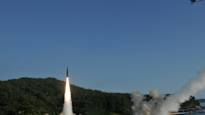Since the arming of Ukraine is a public topic of discussion, the Russian leadership also gets to comment and threaten, writes ‘s Russia correspondent Heikki Heiskanen.
Heikki HeiskanenRussia correspondent
MOSCOW A recurring drama has formed around the arms aid to Ukraine. It goes like this:
Ukraine is asking the Western powers for a certain weapon system. The western media is covering the issue diligently. Russia warns Western powers against supplying weapons in threatening terms. Western powers supply the weapons. The war continues.
For the past few weeks, there has been a debate about whether Ukraine will be allowed to strike deep into Russia with Western missiles. It is above all the Storm Shadow missiles supplied by Britain and the US ATACMS missiles.
President of the United States Joe Biden and the British Prime Minister Keir Starmer’s the meeting last Friday did not produce a decision, at least not a public one. Discussions are expected to continue during the UN General Assembly next week.
Ritual reflects tensions In the relations between Ukraine and its Western supporters.
Ukraine most obviously needs the leverage of public opinion to pressure Western governments to provide the necessary arms support.
In the long run, this seems like an awkward way to handle Ukraine’s arming. Since the discussion is held in the media, Russia also gets to have its say.
On Thursday of last week, the President of Russia Vladimir Putin announced that permission to launch missiles deep into Russia would mean NATO was directly at war with Russia.
Putin’s reasoning was that missiles cannot be launched and guided to the target without satellite intelligence from Western countries. Therefore, according to him, the United States, the EU and NATO would be immediately involved in missile strikes.
Of course, Putin did not specifyhow exactly would Russia react. He likes to leave that up to guesswork.
As is their custom, the Russian rulers have of course reminded that Russia is a nuclear weapon state. Recently, Russian authorities have said that the country’s nuclear weapons doctrine is to be reformed.
The foreign policy expert known as a hawk of a sharp line has appeared in public Sergei Karaganov. Karaganov wrote already in June of last year that Russia’s nuclear deterrent has been watered down. His in his opinion Russia should restore the nuclear deterrent effect, if nothing else, by making a limited nuclear attack on some European countries that support Ukraine.
The power of Putin’s warning is eating awaythat the Russian leadership has previously set several “red lines” but has not reacted to crossing them.
Ukraine has hit Crimea with Western missiles. The United States has given Ukraine permission to use Western missiles to attack the Russian side near the border. Ukrainian troops have invaded the Kursk region on the Russian side.
Russia did not react, at least by expanding the war from Ukraine.
The vagueness and flexibility of Russia’s “red lines” naturally increases confidence in the West that Russia will not actually carry out its threats.
Many armchair generals of social media is one hundred percent sure that Russia’s speeches are just a bluff. The postponement of the missile decision suggests that the US administration is still not completely certain about the issue.
One speculation is that Russia could respond by supplying weapons to US adversaries in the Middle East. For example, Yemen’s Houthi rebels could practically stop oil shipments in the Red Sea if they had more powerful missiles.
There may also be a danger that the Russian leadership will paint itself into a corner with its own harsh words. At some point, Putin and his inner circle may feel that in order to save face, they are forced to react spectacularly.
In a public handshake has its own risks for Ukraine as well.
If the United States or other Western countries suddenly refuse to provide a weapon system, it will appear as a bad setback for Ukraine: Russia has been able to dictate the limits of Western arms aid.
The public opinion wants to make advanced weapons systems symbols of the whole arms aid, some kind of magic tools, even though no single weapon will solve the war.
This might distract from the problems of prosaic mass production. I traveled a lot in European countries there have been difficulties produce enough 155 millimeter artillery shells for Ukraine’s needs.
In March, the US news channel CNN toldthat Russia produces three times more artillery ammunition than the United States and Europe for Ukraine.
